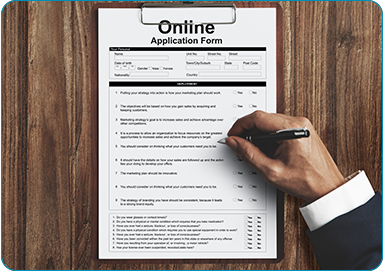Apply for a Michigan Tax ID Today, Quickly and Easily
You need a Michigan tax ID to run a business in the state of Michigan. It becomes your official business identity for handling all your official tax obligations with the IRS.
If you’re looking for an easy way to get yours, read this detailed guide.
What is a Tax ID?
A tax ID (also called the EIN) is an ID number the government uses to track a business for tax purposes. It’s crucial for financial and legal business processes. From opening a business bank account to seeking funding, you’ll need an EIN for several purposes.
You’ll also need a Michigan tax ID to file taxes, apply for important licenses and permits, and even enter into business contracts. Tax IDs come in different forms and can be for both individuals and businesses. Here, we’ll just focus on the EIN for a business.
Types of Tax ID Applications You Should Know
Though the scope of this page is to discuss the EIN, people often get confused with different tax IDs that are available.So, let’s discuss the common types of tax IDs to give you some clarity.

Employer Identification Number
An Employer Identification Number (EIN), also called a Federal Tax ID, is used to identify a business for tax purposes. Businesses need one for tax returns if they hire staff, operate as a Limited Liability Company, corporation, or partnership.

Social Security Number
The Social Security Administration issues Social Security Numbers (SSNs) to US citizens, permanent residents, and certain temporary workers. While they aren’t business tax IDs, sole proprietors without employees can use an SSN to file taxes.

Individual Taxpayer Identification Number
The IRS gives out individual taxpayer identification numbers (ITIN) to anyone who needs a Michigan tax ID but doesn’t qualify for an SSN. It’s used as a substitute for tax processing by citizens and foreign residents, their spouses, and dependents.

State Taxpayer Identification Number
A state tax ID is different from a federal EIN and is required for businesses that collect sales tax or meet specific state tax rules. The state tax ID normally applies to companies operating in states with sales tax laws or other tax obligations.
Why Apply for a Tax ID: Key Benefits
You need a Michigan tax ID to smoothly run any type of LLC, S-Corp, or corporation. It’s also necessary to meet several legal business requirements. Here are the reasons you need to get one.
Easier Tax Filing
A tax identification number makes it simpler to file taxes with the IRS by ensuring your income and business earnings are accurately recorded. This helps prevent mistakes that could cause reporting issues and reduces the risk of penalties.
Having a Michigan tax ID can also speed up tax refund processing. This allows you to receive any money owed to you sooner, allowing you to streamline your accounts. It’s a straightforward step that supports smooth and accurate tax management.


Stronger Business Reputation
Filing for a Michigan tax ID shows your business operates legally and is recognized in the industry. Getting an Employer Identification Number shows your clients, partners, and vendors that you run a legitimate, legally compliant business.
This level of credibility makes it easy to get good opportunities because people generally prefer working with businesses that have verified tax identification. Your EIN stands as proof that your company is recognized by the state government.
Ability to Access Business Credit
You can build a credit profile for your business that’s separate from your finances once your Michigan tax ID is active. This separation is crucial for securing startup funds, attracting investors, opening credit lines, and shielding you against lawsuits.
Moreover, banks need you to provide an EIN to open deposit accounts for your business. This helps you access bank loans, negotiate better financing terms, and manage all your daily business transactions more efficiently with minimal risks.


Capability to Hire Employees
A Michigan tax ID application gives you the ability to hire employees legally and handle payroll the right way. An EIN is required to report employee taxes, set up withholdings, and comply with all necessary federal and state requirements.
This becomes especially useful as your business grows, as having an EIN in place lets you move quickly when you need to bring new staff on board. It also helps you classify workers correctly and maintain accurate employee records for compliance.
Protection of Personal Information
Filing for a Michigan tax ID helps protect your details by reducing the need to use your SSN for business purposes. For sole proprietorships, relying on an SSN for your business operations can expose personal data to risks like identity theft and fraud.
By getting an EIN, you can use it instead of your SSN in contracts, bank accounts, and other business dealings. This keeps personal information out of routine business records and lowers the chances of it being exposed in transactions.


Streamlined Business Setup
You need a new EIN for operational and ownership changes when you restructure or expand your company. This is a regulatory requirement that makes it easy for the IRS to track the business and all the changes or mergers accurately.
A tax ID also allows you to apply for government grants and sign contracts that help your business expand. When you secure a tax ID early for your business, you ensure that everything you do is above board and ready for possible future opportunities.
Why Should You Outsource Your Tax ID Application?
The application process for a Michigan tax ID involves a lot of steps. Outsourcing to experts makes the process smooth. Here are the benefits.

Saves Your Time and Effort
Filing for a Michigan tax ID through MTO can take a long time. Outsourcing allows professionals to handle paperwork efficiently, freeing up more time for business.

Reduces Application Filing Mistakes
Errors in forms or missing information can delay your Michigan tax ID activation. Experts know the process well, so they minimize risks that often cause longer review times.

You Get Expert Guidance
Understanding the government requirements isn’t easy. A professional understands the required paperwork, ensuring your application for a Michigan tax ID is correctly filed.

Ensures Regulatory Compliance
A Michigan tax ID connects the state and federal reporting. Outsourcing ensures your registration matches IRS and Michigan Department of Treasury requirements.

Handles Follow-Ups On Your Behalf
Applications can trigger extra questions. Outsourcing allows specialists to handle the back-and-forth communication, saving you time and energy.

Offers You Peace of Mind
By outsourcing your Michigan tax ID registration, you avoid administrative stress. This lets you stay focused on business growth, knowing the paperwork is handled.
How to Apply for a Michigan Tax ID
Applying for a Michigan tax ID involves dealing with multiple government departments.Here’s the step-by-step you can follow.
1. Check if You Qualify for a Tax ID
First, ensure your business qualifies for an EIN before starting the application. If you have employees, you’ll need one to meet federal tax requirements. Corporations, partnerships, and LLCs must apply to operate legally in the state.
Sole proprietors may also need an EIN if they plan to hire or handle excise tax filings. Checking the requirements first saves time and ensures you’re following the right steps from the start, avoiding issues with taxes or daily operations later on.


2. Gather the Needed Details
Next, gather key details like your business’s legal name, trade name, and physical address. Include the SSN, ITIN, or EIN of the responsible party. Clearly state your business structure, whether it’s a sole proprietorship or corporation.
Record your official start date and the main reason you’re applying for an EIN. This information helps the process move faster and ensures your application is accurate. This prevents delays or requests for additional documentation later on.
3. Pick Your Filing Method
You can apply for an EIN online, by mail, fax, or by phone if you’re outside the US. The online application is the quickest option and lets you get your number the same day. You can also use a trusted filing service for a secure and accurate submission.
Before choosing an application method, check the processing times and any specific requirements. This helps you pick the option that fits your timeline best and ensures your application is handled by the right people without any back-and-forth.


4. Choose the Right Provider
You can use third-party filing services if you don’t want to go through the hassle of applying for a Michigan tax ID. These providers, like GovDocFiling, can handle your EIN request for a fee, which can help if you’d rather not manage the process yourself.
They use a simple online form, making the application quicker while reducing common errors. They also check for compliance with IRS requirements, which is important since a Michigan tax ID depends on having valid documents first.
5. Fill Out Your Form
Check every detail before sending your Michigan tax ID application to avoid issues. You need to complete the IRS Form SS-4 accurately, as even the smallest errors can lead to delays, extra document requests, or outright rejection of your application.
Review names, identification numbers, and business information carefully before submission. Also, keep a secure copy of everything you send so you have proof of what was filed. This also makes it easy to respond quickly to urgent requests.


6. Send in Your Form
Once you finish your Michigan tax ID application, send the filled-out Form SS-4 to the IRS for processing. If you apply online, your federal EIN is issued immediately, making it the fastest method. Faxed applications usually take about 4 working days.
If you choose to physically mail your application, expect to wait up to four weeks, depending on IRS workloads. Therefore, pick the method that matches how quickly you need your EIN, and keep a copy of what you send for your records.
7. Secure and Use Your EIN
Once your tax ID application is approved, you can start using it. Keep your confirmation letter in a secure place so you can access it quickly when needed. Also, set up a calendar that tracks all tax filing dates and compliance requirements.
You’ll use your EIN for filing taxes, starting a business bank account, applying for permits, and other official transactions. Staying organized from the start helps you keep your business in good standing without unnecessary delays or issues.


8. Stay Compliant with Reporting
Staying compliant with reporting after you secure your Michigan tax ID means you file and pay the right taxes. These include sales/use, withholding, unemployment, and corporate income, and they have to be settled within the state deadlines.
This ongoing reporting protects your business from being hit with costly penalties, interest, and possible liens from the IRS. It ensures your business reputation is in good standing and continues to attract new investors and secure more loans.
Why Should You Choose GovDocFiling for Your Tax ID Application?
Forming a business involves a lot of moving pieces, and you might get lost if you choose to handle it all by yourself. Ease that burden by outsourcing the process to GovDocFiling. Here’s why.

Remove Uncertainty From the Process
Our experts know the Michigan tax ID steps, so you’re never guessing what form to file, which office to send it to, or when to meet deadlines.

Prevent Delays From Minor Errors
One small error can set your Michigan tax ID timeline back. An expert helps you avoid that by smoothly moving it forward without delays.

Remain Compliant With Requirements
Compliance with state rules is non-negotiable. Outsourcing your application ensures every detail meets state and federal standards.

Gain Practical Tax Guidance
An experienced advisor handles your application and shows you how to secure a Michigan tax ID and potential tax advantages.

Reduce Time and Stress in Filing
Letting us manage your Michigan tax ID application saves you time, reduces stress, and frees you from making constant follow-ups.

Launch Your Business Without Delay
Our experts know how to fast-track your Michigan tax ID filings, ensuring you get your EIN without the back-and-forth delays that often happen.
FAQ
If you want to get a Michigan tax ID number, you’ll want to go through the Michigan Department of Treasury’s Michigan Treasury Online (MTO) system. Start by creating a user profile on MTO, where you’ll set up your account with a username, password, and security questions.
Once you’ve logged in, click on “Start a New Business (E-Registration)” to start the registration process with the Treasury for state tax purposes. If your business already has a federal Employer Identification Number (EIN), that number becomes your Treasury business account number.
Once your Michigan tax ID registration is active, you can head back into MTO to connect your user profile to the business account. This gives you access to manage filings, pay taxes, and link your tax account.
Alternatively, you can outsource the entire application process to an expert service provider like GovDocFiling and avoid the hassle.
The IRS doesn’t publicly share EINs for general businesses. You can only find an EIN if you’re looking up a registered nonprofit or tax-exempt organization. And even then, you can only do it through IRS tools.
If you’re dealing with a tax-exempt organization in Michigan, such as a charity or nonprofit, the IRS offers a public database called the “Tax Exempt Organization Search.” You can enter the organization’s name, city, or EIN and narrow the state to Michigan. If the organization is listed, the search results will show its EIN.
For regular businesses, like an LLC or corporation, the EIN is not visible through any public state or federal search tools. The Michigan state database, accessible through the LARA (Department of Licensing and Regulatory Affairs) MiBusiness Registry Portal, lets you search by business name, filing number, or entity ID.
It does not display the federal EIN. But you can still see whether the business is active, its date of business formation, entity type, registered agent, and filing history.
Most businesses in the US must apply for a tax ID. Here’s a breakdown of who needs one:
- Businesses with Employees: Any business hiring staff must obtain a tax ID to manage payroll taxes and meet IRS requirements. This applies to sole proprietors, partnerships, corporations, and LLCs.
- Corporations: Both C-corporations and S-corporations need a tax ID. It separates the business legally from its owners and is required for filing corporate returns, handling payroll taxes, and staying compliant with federal rules.
- Partnerships: A partnership is considered a separate entity from its owners. Therefore, the partners must file tax returns and report income using an EIN, regardless of whether they have employees.
- Multi-Member LLCs: Even without employees, multi-member LLCs require an EIN. The IRS generally treats them as partnerships unless they choose corporate taxation, which makes the tax ID mandatory.
- Estates and Trusts: Executors or trustees need a tax ID to manage estate income, file necessary tax returns, or handle distributions. This ensures proper reporting after someone passes away.
- Nonprofit Organizations: Nonprofits, including churches and charities, must apply for a tax ID. Even tax-exempt organizations need one to apply for recognition, report donations, and maintain financial accountability.
- Certain Sole Proprietorships: Most sole proprietors use their SSNs, but a tax ID is required if they hire employees, pay excise taxes, or open business bank accounts.
- Businesses That Change Their Structure: If a sole proprietorship becomes an LLC, partnership, or corporation, a new tax ID is required. This ensures the business is properly registered under its new structure.
Getting a Michigan tax ID number is free. The Internal Revenue Service issues Employer Identification Numbers (EINs), and Michigan doesn’t charge any extra fee for you to get one.
The IRS clearly states you don’t have to pay a fee for an EIN, and you can apply online, by mail, or by fax at no charge.
However, you may come across service providers or third-party companies offering to get an EIN for you, but those generally charge anywhere from around $50 to $300, depending on the service package. That’s the price for convenience and some extra services, in many cases.
On the Michigan side of things, there’s no additional cost imposed. Michigan’s Department of Treasury points you back to the IRS for obtaining the EIN and specifically refers to it as a federal ID number issued by the IRS.
Michigan doesn’t have a value-added tax. The state uses a sales and tax system instead. Michigan’s general state sales tax rate is 6%, and the state doesn’t allow any city income tax or county sales taxes on top of that.
A matching 6% use tax applies when taxable items are brought into Michigan or bought from out-of-state sellers that don’t collect Michigan tax. The use tax also covers certain services, including telecommunications and hotel or motel accommodations.
Ready to Kickstart Your Michigan Tax ID Application?
GovDocFiling makes tax ID applications easy and compliant with the law. Plus, you get round-the-clock guidance from a dedicated team of experts.
You’ll get smooth tax ID applications no matter the type of your business structure.
